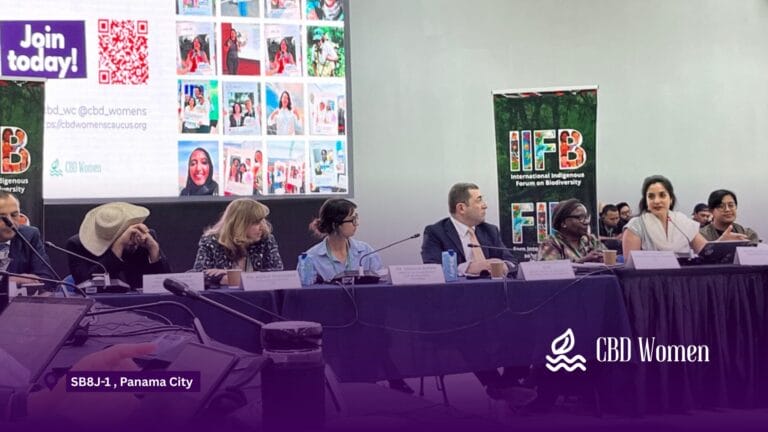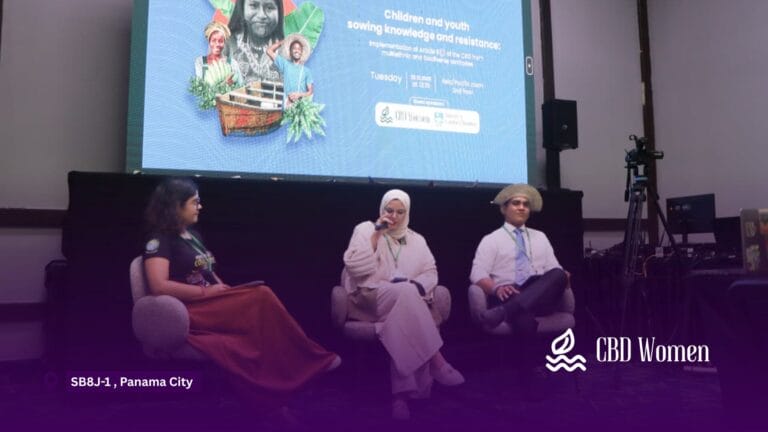By Amelia Arreguin Prado, CBD Women’s Caucus Coordinator
Land is the common thread running through the Rio Conventions. All three rely on land-based measures to achieve their goals, with the designated land often already managed by local communities and Indigenous Peoples who depend on it for their livelihoods. The recognition of land rights – particularly those of women – is key to the success of all three Rio Conventions. Yet, the mechanisms to advance women’s tenure rights through these Convention processes remain underexplored. The Women’s Land Rights Initiative (WLRI) was launched in 2023 to explore how women’s land rights can be structurally anchored within the Rio Conventions to promote land tenure for women.
The objectives of the session ”The Women’s Land Rights Initiative: Advancing women’s land rights through the Rio Conventions“ at the World Bank Land Conference 2025 brought together key experts and practitioners, including Wiebke Bender (Programme Manager – Gender and Climate Change, UN Climate Change), Verona Collantes-Lebale (Senior Gender Specialist, GEF), Laura Rahmeier (Senior Project Manager, Robert Bosch Stiftung), Amelia Arreguín Prado (Coordinator, CBD Women’s Caucus), and Frederike Klümper (Programme Lead – Land Governance, TMG Research), who shared valuable insights on these pressing issues.


Event Highlights and Activities
can help advance women’s land rights. All three Conventions – UNFCCC, CBD, and UNCCD – are centered on land-based solutions to climate action, biodiversity conservation, and combating desertification. Yet, despite the importance of land in achieving the Conventions’ objectives, women’s land rights remain largely underexplored within these frameworks.
Speakers highlighted the critical need to better integrate local realities into global policy processes. Policies created at the global level must reflect the lived experiences of women on the ground. Without this integration, policies risk being disconnected from those most affected by the issues at hand, particularly women who are defending and managing their land and resources.
The CBD Women’s Caucus, represented by Ms Amelia Arreguín-Prado provided a key perspective in the session, emphasizing the importance of recognizing the gendered dimensions of land and territory.
Ms. Arreguín-Prado highlighted that land is not merely a resource but a living territory. These territories are woven with cultural, spiritual, ecological, and sustenance relationships that need to be protected. Moreover, this extends to coastal and marine ecosystems, areas that are often ignored when discussing land rights. Ms. Arreguín-Prado also drew attention to the Global Biodiversity Framework (GBF) and its Gender Plan of Action (GPA) as key tools in advancing gender justice. However, without clear monitoring mechanisms and dedicated resources, these frameworks may fail to bring about meaningful change for women in practice.
Transformative Financing for Women’s Land Rights
A significant portion of the conversation focused on the issue of financing women’s land rights. The speakers emphasised that financing for women’s land rights is not just a technical issue, but also a deeply political one. Structural inequalities, particularly for Indigenous and local women, must be addressed through transformative financing to ensure these women have the necessary resources to defend their lands and advocate for their rights.
The session emphasised that financing mechanisms need to go beyond short-term grants or pilot projects. Instead, they must be flexible, multi-year investments aimed at supporting women’s organisations that are already working on the ground to protect land and biodiversity. Moreover, it is crucial that women have full participation in decision-making processes regarding the allocation of public resources for conservation, ensuring that decisions reflect the needs and priorities of local communities.
Ms Arreguín-Prado called for a fundamental shift in financing mechanisms, advocating for funds that not only mitigate harm but also foster a just relationship with land and biodiversity. Financing must recognize the transformative role of women in conservation and ensure that resources are directed toward long-term, sustainable solutions that support women’s leadership and rights in the protection of their territories.
From local reality to global policy
The key takeaway from the session was the need for global policies to reflect the lived realities of women who are defending their territories. Women’s land rights cannot be treated as peripheral issues in global policy discussions. Instead, they must be central to achieving the goals of the Rio Conventions, particularly in terms of climate action, biodiversity conservation, and land management.
The Women’s Land Rights Initiative, alongside the efforts of the CBD Women’s Caucus, continues to push for policies that not only recognise women’s contributions to biodiversity but also empower them to lead the charge in environmental protection. For these policies to be truly transformative, they must be rooted in the realities of those most affected by land issues, with financing mechanisms that support long-term, gender-just solutions.
Disclaimer: The views expressed in this blog are those of the author and do not necessarily reflect the official position or opinions of the CBD Women’s Caucus.




